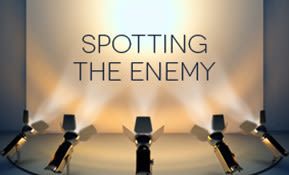
The Photo Album
A person might be able to fool others, wearing a beard and dressing in long black, but he can't hide his thoughts from Hashem. That's embarrassing...

Translated by Rabbi Lazer Brody
Our year-long battle of warding off the evil inclination assumes special importance in the month of Elul when Hashem gives us extra help in doing teshuva.
How do we guard against the evil inclination?
Rabbi Velvel Cheshin of saintly and blessed memory used to paraphrase the Zohar and comment that the evil inclination’s gate of entrance into a person is by way of the eyes.
Whatever a person sees, he contemplates. Anything a person sees becomes recorded on his brain, available for recall at anytime. Our brain’s recall molds our thoughts – good or otherwise. Rebbe Nachman says (Likutei Moharan I:49) that positive thoughts are the manifestation of our good inclination and that negative thoughts are the manifestation of the evil inclination. Therefore, by loading our eyes, brain and heart with Torah and emuna, we reinforce our inclination to do good and we gain an emotionally healthier, positive outlook on life.  On the other hand, when a person fills his eyes, brain and heart with images of strange women – let alone outright lewd images – he fuels the evil inclination and corrodes his own emotional and spiritual well-being.
On the other hand, when a person fills his eyes, brain and heart with images of strange women – let alone outright lewd images – he fuels the evil inclination and corrodes his own emotional and spiritual well-being.
Negative thought are not only thoughts of transgressions, but also idle thoughts as well that waste a person’s mental energies on naught. The Baal Shem Tov teaches us that a person is where his thoughts are: if they are lofty, so is he. But, if his thoughts are in the gutter, he is there as well. Idle thoughts, although seemingly innocuous, lead to boredom and ultimately to insanity. A mind that doesn’t develop is a mind that regresses.
Since one’s sight so strongly influences one’s thoughts, even without seeing forbidden things, one can’t cling to Hashem without closing his eyes. Whatever we see is what occupies our thoughts at the moment. Immodest and forbidden sights pull one’s heart and brain to the area of immodest and forbidden thoughts.
Here’s an example: suppose someone sees something seemingly innocent, like a new Mercedes. Since his sight influences his thoughts, his mind begins to race: “How much does the car cost? Who’s driving that car? Why does he deserve it and not me?” His mind races in all different types of directions, conjuring up thoughts of jealousy, competition, contention and dissatisfaction, just to name a few. They thoughts are liable to surface later as gossip and slander as well.
Our sages tell us that the heart covets what the eye sees. The eyes are therefore known as the panderer of transgressions. A person might be able to fool others, wearing a beard and dressing in long black, but he can’t hide his thoughts from Hashem. That’s embarrassing, for his thoughts are one giant high-resolution photo album of everything he sees.
True fear of Hashem is knowing – and feeling – that Hashem sees everything that is in his mind and heart. Less than that is merely “costume” or external fear of Hashem. Other people see our actions, but Hashem sees our thoughts.
Since our eyesight molds our inner dimension, both emotional and spiritual, then our power of free choice begins with what we see. Once a person sees something – click! It’s as if the shutter of his mind’s camera has snapped and the image is already recorded on his brain. So, if a person wants to keep his mind in wholesome places, he must avoid looking at unwholesome sights. Only when the eyes are completely guarded, can a person cling to Hashem like his soul truly desires. Without guarding one’s eyes, one loses free choice, for he loses the option of clinging to Hashem. Samson was a holy man, dedicated to a life of holiness from the time he was born. The beginning of his downfall was when he laid eyes on the wicked Philistine women Delilah. The heart sees by way of the eyes and the eyes are the prime influence of the heart.
With closed eyes, a person can focus exclusively on Hashem, on Torah and on his own human futility. Sure, he still has the free choice to contemplate his ego and himself, but when he opens his eyes, he loses his free choice altogether, for he’ll now think about what he sees.
All lust begins with the eyes. A person should consequently beg Hashem to help him guard his eyesight that he can assure himself free choice. Accordingly, the true tzaddikim would picture the letters of Torah or the letters of Hashem’s Name in their mind’s eye wherever they’d go, to preserve their free choice. This is exactly what King David meant when he said, “I place Hashem before me always” (Psalm 16:8) – in his mind’s eye, he’d see nothing but Hashem’s Name; he’d cling to Hashem and think about Him day and night.
Our eyes should either be closed, engrossed in Torah study or in a prayer book, or when we’re alone, looking at such sights like a blue sky, a waterfall, a blossoming orchard, an eagle in flight or a majestic mountain that will help us appreciate the magnificence of Hashem’s creation and His majesty. We should not allow anything to enter our hearts that will stifle or inhibit our yearning for Hashem and our desires for holiness in any way. This was the level of our patriarch Abraham – he attained his lofty spiritual level by virtue of the care he took in guarding his eyes.
Even looking at an innocent or harmless sight leaves its impression on the brain and heart. Yet, the image of a woman not only leaves a striking impression on the brain and heart but triggers lewd and destructive desires, and kindles the fires of lust. A “religious” man who is enticed by the looks of a woman won’t care if she’s married or not Jewish at all; he’ll still crave her. He’ll forget about his wife and children and forfeit his entire purity and spirituality, all because he looked at a woman. If he could only monitor his own thoughts, he’d see how they were jeopardizing his entire life as well as severing his connection with Hashem! Who would willfully allow such a thing? If a person told him to surrender his Judaism and breach his holiness, would he, even at gunpoint? So why does he do it to himself? This is only proof that a person has no idea what happens to him when he looks at a woman.
Let’s be honest with ourselves. What are we carrying around in our mind’s photo album? If we’re embarrassed of the pictures, it’s time to throw them out and replace them with new ones – pages of Psalms, pages of Gemara, and the faces of tzaddikim, may we follow in their footsteps, amen!







Tell us what you think!
Thank you for your comment!
It will be published after approval by the Editor.